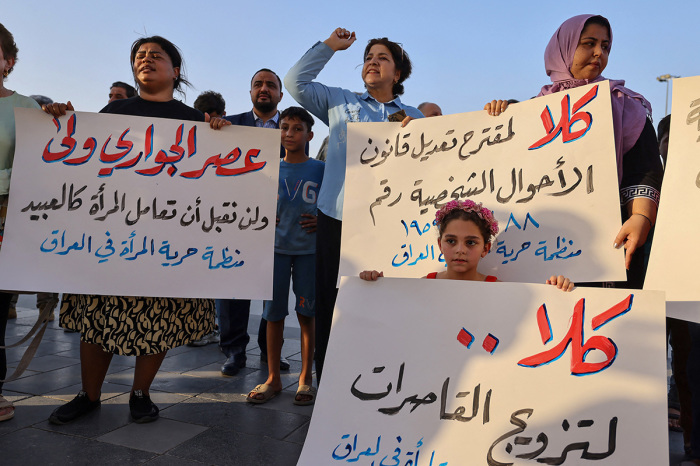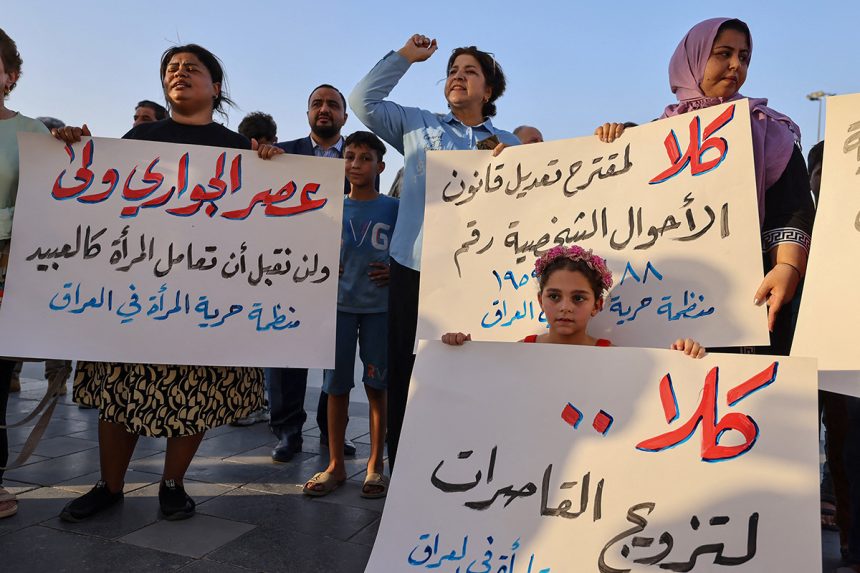
Iraq is considering a constitutional amendment that would lower the legal age of marriage for girls to 9 years old, effectively legalizing child rape.
The proposed legislation, driven by Shia Muslim politicians, also threatens to strip women of fundamental rights, including divorce, child custody and inheritance.
The amendment seeks to overturn Iraq’s “personal status law,” known as Law 188, which was introduced in 1959 and hailed as one of the most progressive in the Middle East. Law 188 provides a unified set of rules governing family affairs for all Iraqis, regardless of their religious sect.
The proposed changes would dismantle these protections, allowing religious laws to dictate personal matters without judicial oversight.
The governing coalition’s push for the amendment is part of a strategy by Shia Islamist groups to consolidate power and regain ideological legitimacy, Renad Mansour, a senior research fellow at Chatham House, told The Telegraph last month.
“It’s the closest it’s ever been,” Mansour said. “It has more momentum than it’s ever had, primarily because of the Shia parties. It’s not all Shia parties, it’s just the specific ones that are empowered and are really pushing it.”
The second reading of the amendment was passed on Sept. 16, marking a significant shift after previous attempts to amend Law 188 in 2014 and 2017 failed due to strong opposition from Iraqi women.
Groups like Human Rights Watch have voiced severe concerns over the proposed changes and how they will negatively impact women and children.
“This draft personal status law flies in the faces of the Iraqi government’s legal commitments to protect women’s and girls’ rights,” said Joe Stork, deputy Middle East and North Africa director at HRW, in a statement.
“Passage of this law by parliament may lead to further discriminatory laws. It is all well and good to have a good constitution on paper, but lawmakers need to respect its principles.”
UNICEF reported in April 2023 that around 28% of Iraqi women are married by the age of 18, and under the current law, girls as young as 15 can be married with parental and judicial consent.
These marriages often occur in economically disadvantaged, fundamentalist Shia communities, where religious leaders officiate thousands of marriages annually. These unregistered marriages leave girls and their children without access to healthcare, education and legal protections.
Jeff King, president of the U.S.-based persecution watchdog International Christian Concern, says the amendment “legalizes child rape,” attributing the legislative push to “fundamentalist Islam,” CBN News reported.
King called for global support to oppose the amendment, urging individuals to “stand up for these women” by contacting representatives and seeking ways to apply pressure on Iraqi lawmakers.
The amendment has sparked widespread protests and condemnation within Iraq, including demonstrations in August in Baghdad and other cities, organized by Coalition 188, a group of female activists opposing changes to Law 188.
“What they aspire to in parliament is not in the interest of society, but their personal interest,” Al-Hassan told The Telegraph.








